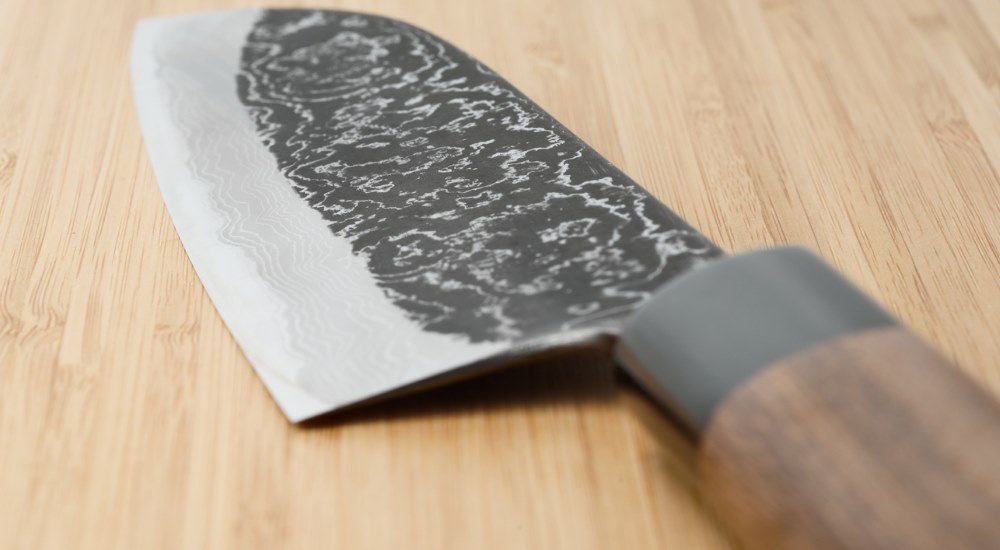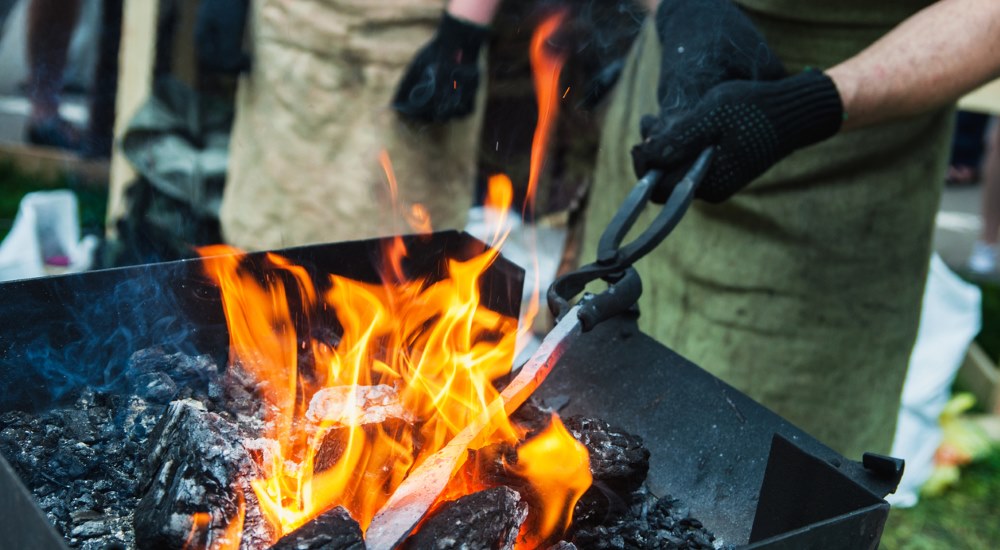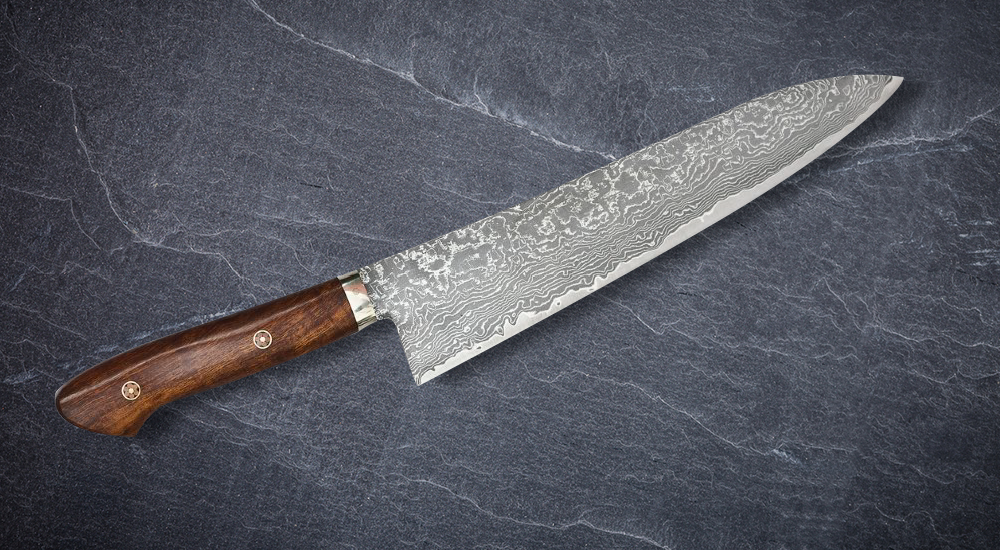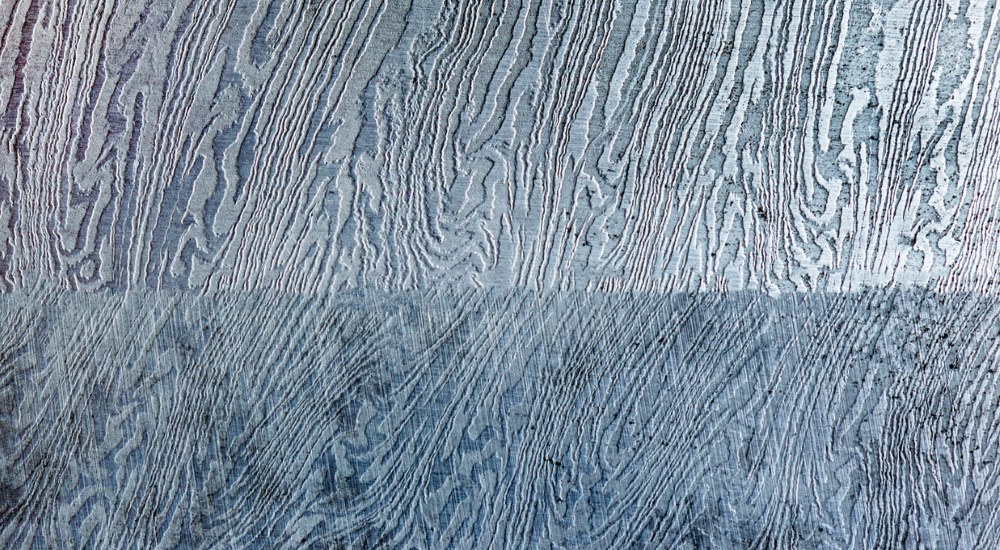Damascus knife guide

Modern Damascus steel can be recognised by the beautiful pattern found on the surface of the blade. These sought-after knives also have a reputation for being incredibly strong and sharp.
The following page will answer some of the most commonly asked questions around Damascus steel kitchen knives.
Click on the following links to jump to the relevant sections:
- What is a Damascus knife?
- How are Damascus knives made?
- How do you sharpen a Damascus knife?
- Do Damascus knives rust?
- Do Damascus knives hold an edge?
- How to clean Damascus steel?
- When was Damascus steel invented?
- Are Damascus kitchen knives good?
What is a Damascus knife?
Damascus knives are knives made from Damascus steel. It is the technique used to make the steel that marks them as ‘Damascus’ rather than any other part of the knife design.
Damascus knives can be identified by the wavy, mottled pattern than runs through the blade.
How are Damascus knives made?

Modern Damascus steel is made by either forge-welding different types of steel together before twisting and manipulating the metal, or by flattening out and then folding a single type of steel in order to produce layers in the metal. Both these techniques result in the wavy, ‘organic’ pattern that is typical of Damascus steel kitchen knives.
The technique used to make modern Damascus steel is primarily for aesthetic reasons; however, the folding and refolding process does have the benefit of evening out any natural impurities in the metal.
Techniques such as acid etching can also be used to emphasise the unique pattern created by this process.
Ancient Damascus steel is entirely different to modern Damascus steel. The exact knowledge of how to produce ancient Damascus is now lost to history.
Ancient Damascus steel was famed for its strength and durability. It was produced in areas of the Near East using a type of steel originally from India called wootz steel. Wootz steel is characterised by levels of carbon compounds known as ‘carbides’, which run through the steel.
Analysis of ancient Damascus blades shows that certain impurities added during the production process acted to strengthen the steel, making it more flexible and less likely to break.
How do you sharpen a Damascus knife?
Damascus steel requires no special techniques for sharpening. As with all quality knives, the best way to sharpen a Damascus blade is by using a whetstone.
Click here for more information on how to sharpen a kitchen knife.
Do Damascus knives rust?
Modern Damascus steel knives can be made from a variety of different steels. Whether a Damascus steel knife rusts will depend on the type of steel from which it is made.
Most steel used for Damascus kitchen knives is stainless and does not rust. Popular knife brands that sell items made from Damascus steel, such as Shun and Kasumi, use this type of steel.
For knives made from high-carbon steel, it is important to clean and dry immediately after use. Regularly oiling the blade can also help to prevent rust.
Do Damascus knives hold an edge?

High-quality Damascus blades hold their edge well. This is because the knives are usually made from an inner core of high-carbon specialty steel surrounded by softer stainless steel which has been forged to produce the distinctive Damascus pattern.
Due to the hardness of the inner core, the blade’s edge will remain sharp, while the softer stainless steel acts to protect the core from chipping.
How to clean Damascus steel?
For any quality, it is advisable to wash after every use and thoroughly dry before storing in a block or magnetic rack.
Never wash your knives in a dishwasher as this can lead the blade to become chipped. If you are concerned about rust, apply a protective layer of oil after washing. You can use simple food-grade mineral oil or cooking oil; however, cooking oil can become congealed and start to smell if left for a long time.
For more on how to clean a kitchen knife, read our page ‘10 Most Common Chef Knife Care Mistakes and How to Stop Making Them’.
When was Damascus steel invented?

Modern Damascus steel is created through the technique of pattern welding, which was in use as early as 200 CE. The first knives in the modern era to be labelled as ‘Damascus’ were produced in the 1970s.
Traditional ancient Damascus steel, created by adding impurities to wootz steel, was also first produced at the beginning of the first millennium, around 300 CE.
Are Damascus kitchen knives good?
This really depends on the quality of knife you buy. Most high-end Damascus steel kitchen knives are famed for their sharpness and ability to maintain their edge well. This is because they are made from a hard steel sandwiched between softer steel. The hard steel creates a sharp edge, while the softer steel acts as protection.
However, some cheaper Damascus kitchen knives are made using a technique designed simply to create a pattern, with little thought for the quality of the cutting blade.
For more information on knives, click on the links below:
- Boning Knife Guide
- Paring Knife Guide
- Filleting Knife Guide
- Pastry knives
- Santoku Knives vs Chefs Knives
- Guide to Carving and Slicing Knives
- Frequently Asked Questions About Granton Edge Blades
- 10 Most Common Chef Knife Care Mistakes and How to Stop Making Them
- How to sharpen your kitchen knife
3 November 2017





